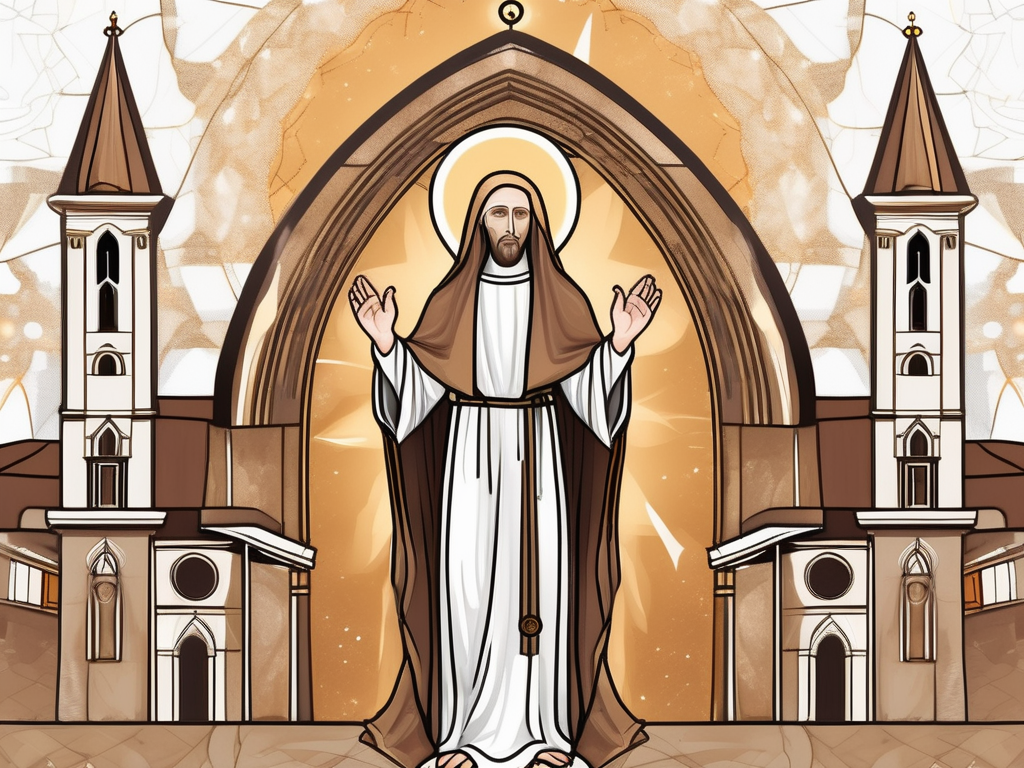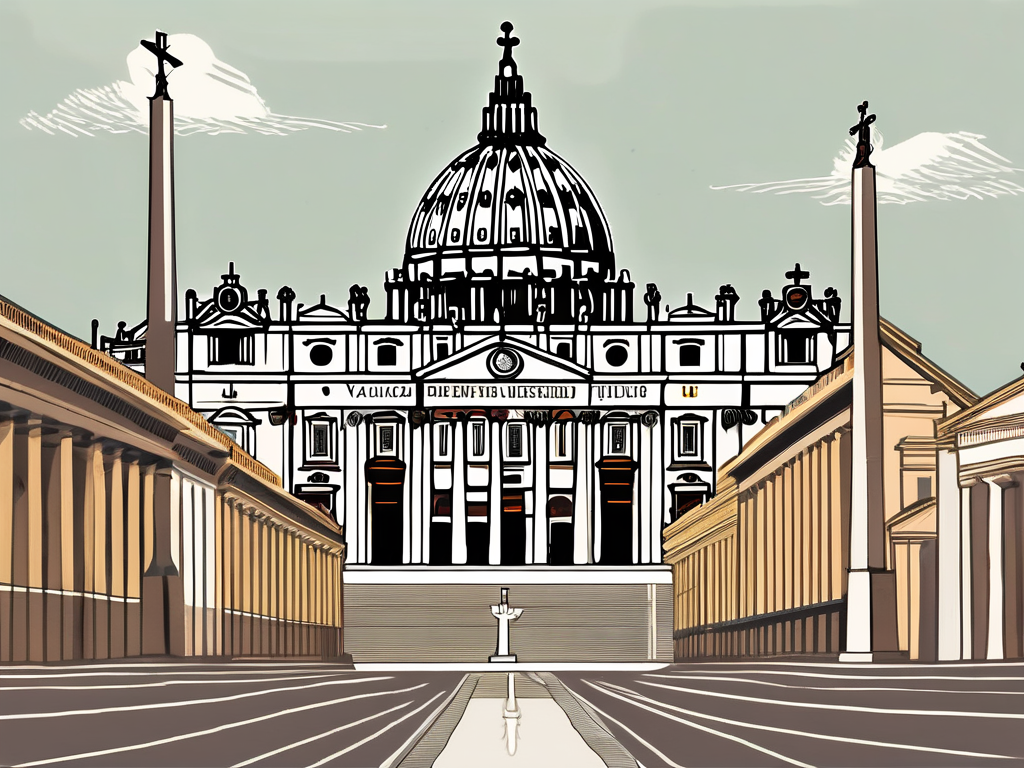Saint Simon the Apostle is one of the prominent figures in early Christianity. His life and teachings have had a significant impact on the development of the faith. Let’s delve deeper into Simon’s life, his role in the early church, his teachings and beliefs, and the lasting legacy he left behind.
Understanding Simon the Apostle
Before we explore Simon the Apostle’s life, it is essential to gain a better understanding of who he was. Simon, also known as Simon Peter or Peter, was one of Jesus Christ’s closest disciples. He was born in Bethsaida, a fishing town on the shores of the Sea of Galilee.
Simon grew up in a Jewish family and was initially a fisherman by trade. He lived a relatively ordinary life until he encountered Jesus, who forever changed the course of Simon’s life.
Simon’s days as a fisherman were filled with hard work and dedication. He would wake up before dawn, preparing his fishing nets and boat for a long day out on the sea. The Sea of Galilee was known for its abundance of fish, and Simon was skilled in navigating the waters and casting his nets in just the right spots. It was a physically demanding job, but Simon took pride in his work and provided for his family through his fishing endeavors.
The Early Life of Simon
Simon’s life took a momentous turn when Jesus called him to be one of his twelve apostles. Alongside his brother Andrew, Simon left his fishing profession to follow Jesus. This moment marked the beginning of a close relationship between Simon and Jesus, which would shape Simon’s future and the course of Christianity.
As Simon embarked on his journey with Jesus, he witnessed countless miracles and teachings that left him in awe. He saw Jesus heal the sick, raise the dead, and perform astounding acts of compassion and love. Simon’s faith in Jesus grew stronger with each passing day, and he became a devoted follower, eager to learn from his master.
Simon’s relationship with Jesus was not without its challenges. He often found himself questioning his own abilities and struggling with doubt. Yet, Jesus saw potential in Simon and gave him the name “Peter,” which means “rock.” This name symbolized the strength and steadfastness that Jesus saw in Simon, despite his human weaknesses.
Simon’s Calling to Apostleship
Simon’s calling to apostleship meant leaving behind his familiar life as a fisherman. It was a decision that required courage and trust in Jesus’ plan. Simon, along with the other apostles, traveled alongside Jesus, witnessing his teachings and miracles firsthand.
Simon’s role as an apostle was not just to listen and observe; he was also entrusted with important responsibilities. Jesus recognized Simon’s leadership qualities and often appointed him as a spokesperson for the group. Simon became a voice for Jesus’ message, spreading the teachings of love, forgiveness, and salvation.
Throughout his time as an apostle, Simon faced numerous challenges and trials. He witnessed the betrayal and crucifixion of Jesus, which left him devastated and confused. However, Simon’s faith was restored when he encountered the risen Jesus after his resurrection. This encounter filled Simon with a renewed sense of purpose and conviction.
Simon’s journey as an apostle was marked by his unwavering dedication to Jesus and his mission. He played a crucial role in the early development of the Christian church, using his leadership and teachings to guide others in their faith. Simon’s legacy as an apostle continues to inspire believers around the world, reminding them of the transformative power of encountering Jesus.
Simon’s Role in the Early Church
Simon played a vital role in the early church, contributing significantly to the spread of the Gospel and the establishment of the Christian community.
Simon, also known as Simon Peter, was one of the twelve apostles chosen by Jesus to be his closest disciples. He was a fisherman by trade and initially had doubts about Jesus’ identity as the Messiah. However, through his interactions with Jesus and witnessing his miracles, Simon’s faith grew stronger, and he became one of the most prominent figures in the early Christian movement.
Simon’s Contributions to the Gospel
Simon’s firsthand experiences with Jesus and his deep understanding of Christ’s teachings made him an influential figure in spreading the Gospel message. He played a pivotal role in proclaiming Jesus as the Messiah and in sharing the good news with others.
Simon’s bold and passionate nature made him a powerful preacher. He fearlessly declared the message of salvation, emphasizing the importance of repentance and faith in Jesus Christ. His sermons were filled with conviction and authority, captivating the hearts and minds of those who listened.
Furthermore, Simon’s personal encounters with Jesus provided him with unique insights into the life and ministry of the Son of God. He often shared anecdotes and stories about Jesus, painting a vivid picture of his teachings, miracles, and sacrificial love. Through his words, Simon brought the Gospel to life, making it relatable and accessible to all who heard him.
The Travels and Missions of Simon
Simon’s commitment to spreading the Gospel led him to embark on various missions and journeys. He traveled extensively, preaching the message of Christ to different communities and regions. His encounters and interactions with diverse cultures and peoples allowed the message of Christianity to reach far and wide.
Simon’s first significant mission took him to the city of Antioch, where he played a crucial role in establishing a thriving Christian community. He worked tirelessly to nurture and guide the believers, ensuring that they remained steadfast in their faith amidst persecution and challenges.
Simon’s missionary journeys extended beyond the borders of his homeland. He ventured into neighboring regions, such as Syria, Asia Minor, and Greece, bringing the Gospel to both Jews and Gentiles. His travels allowed him to witness firsthand the transformative power of the Gospel as countless lives were changed and communities were transformed.
Throughout his journeys, Simon faced numerous obstacles and trials. He encountered opposition from religious leaders, endured physical hardships, and even experienced imprisonment for his unwavering commitment to Christ. However, his unwavering faith and determination fueled his resolve to continue spreading the Gospel, undeterred by the challenges he faced.
Simon’s legacy extends far beyond his lifetime. His teachings and writings continue to inspire and guide believers today. His letters, known as the First and Second Peter, offer timeless wisdom and encouragement to Christians facing various trials and tribulations.
Simon’s role in the early church cannot be overstated. His passion, dedication, and unwavering faith laid a solid foundation for the growth and expansion of Christianity. His contributions to the spread of the Gospel and the establishment of Christian communities continue to impact the world, even centuries later.
The Teachings and Beliefs of Simon the Apostle
Simon the Apostle, also known as Simon Peter, was one of the most prominent figures in early Christianity. His teachings and beliefs had a profound impact on the development of the faith, shaping the lives of believers and guiding them in their spiritual journey.
Simon’s teachings were centered around several key messages that continue to resonate with Christians today. One of the central themes in his teachings was the importance of faith. Simon emphasized that faith in Jesus Christ was not only a belief in his existence, but a complete trust and reliance on him as the Savior and Lord. He taught that through faith, believers could experience a deep and transformative relationship with God.
In addition to faith, Simon also emphasized the need for repentance and forgiveness. He taught that true repentance involved a sincere acknowledgement of one’s sins and a turning away from them. Simon believed that through repentance, believers could experience the forgiveness and grace of God, leading to spiritual renewal and a restored relationship with Him.
Furthermore, Simon’s teachings emphasized the transformative power of Christ’s love and grace. He believed that the love of Christ had the ability to change hearts and lives, and he urged believers to reflect this love in their interactions with others. Simon taught that kindness, compassion, and humility were essential virtues for followers of Christ, and that by embodying these qualities, believers could be a positive influence in the world.
Unity within the Christian community was another significant aspect of Simon’s teachings. He emphasized the importance of believers coming together as one body, supporting and encouraging each other in their faith. Simon believed that through unity, the Church could effectively spread the message of the Gospel and impact the world.
The Impact of Simon’s Beliefs on Early Christianity
Simon’s beliefs and teachings played a fundamental role in shaping early Christian doctrines and practices. His understanding of the Gospel contributed to the foundation of the Church, with its emphasis on faith, repentance, and the redemptive power of Christ’s sacrifice.
Simon’s teachings on faith laid the groundwork for the belief that salvation comes through faith in Jesus Christ alone. This belief became a cornerstone of Christian theology and continues to be a central tenet of the faith. Simon’s emphasis on repentance and forgiveness also influenced early Christian practices, such as the sacrament of confession and the understanding of God’s grace.
Furthermore, Simon’s teachings on love and unity within the Christian community shaped the early Church’s understanding of fellowship and community. The concept of believers coming together as one body, supporting and caring for one another, became a defining characteristic of early Christianity. This emphasis on unity continues to be a vital aspect of Christian faith and practice today.
In conclusion, Simon the Apostle’s teachings and beliefs had a lasting impact on early Christianity. His emphasis on faith, repentance, forgiveness, love, and unity shaped the faith and guided believers in their spiritual journey. The influence of Simon’s teachings can still be seen in Christian theology and practices today.
The Legacy of Simon the Apostle
Simon’s legacy continues to resonate within Christianity, leaving an indelible mark on the faith even to this day.
The Influence of Simon on Modern Christianity
Simon’s steadfast commitment to Christ and his unwavering faith continue to inspire Christians worldwide. His example of humility, repentance, and forgiveness serves as a constant reminder of the transformative power of Christ’s love in our lives.
Remembering Simon: Traditions and Celebrations
Throughout history, various traditions and celebrations have commemorated Simon the Apostle. From feast days to pilgrimages, believers continue to honor his memory, reflecting on his life and teachings.
The Controversies and Misconceptions about Simon the Apostle
Like many figures from history, Simon the Apostle has faced controversies and misconceptions surrounding his life and work.
Debunking Common Misunderstandings about Simon
A common misconception about Simon is related to his moment of weakness when he denied Jesus three times. However, Simon’s subsequent repentance and restoration highlight the power of redemption and forgiveness. His story reminds us that even the most faithful can falter but can find redemption in Christ.
Addressing the Controversies Surrounding Simon’s Life and Work
Various controversies have arisen regarding Simon’s role within the early church and his interaction with other apostles. However, it is essential to approach these controversies with open minds and remember that Simon played a crucial part in establishing the foundation of Christianity.
In conclusion, Saint Simon the Apostle’s life and legacy serve as a testament to the transformative power of faith in Christ. His teachings continue to guide and inspire believers around the world, and his example of repentance and redemption reminds us of the boundless love and grace of our Savior.












